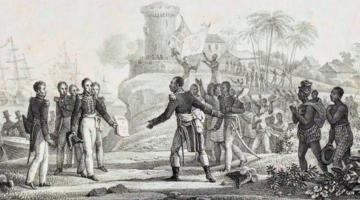Reparations is not a token gesture of concern, apology or even solidarity; it seeks justice and redress of wrongs through the transformation of a people’s condition.
“An all-Black reparations debate is overdue.”
The Democratic presidential race has erupted in incomprehensible babble on reparations. Bernie Sanders says he’s not sure what people mean by the word. Kamala Harrisand Cory Booker, the two Black U.S. senators, cynically put forward programs that bear no resemblance to reparations while claiming to be supporters. And Oprah favorite Marianne Williamson’s $100 billion reparations scheme is far too stingy to “repair” 40 million descendants of slaves.
If Joe Biden finally decides to seek the nomination his impressive favorable ratings among Blacks will likely implode under the accumulated racist baggage of a lifetime. No white man that declares, “I’ll be damned if I feel responsible to pay for what happened 300 years ago” can be trusted to comprehensively right racial wrongs. Beto O’Rourke, the Great Corporate Hope now that Harris and Booker have failed to catch fire, admits that, “As a white man who has had privileges that others could not depend on, or take for granted, I've clearly had advantages over the course of my life” -- but rejects reparations for the descendants of slaves. As far as business-friendly Minnesota Senator Amy Klobuchar is concerned, the race divide can be bridged simply by “looking out for our whole economy: community college, one-year degrees, minimum wage, childcare, making sure that we have that shared dream of opportunity for all Americans.”
“A $100 billion reparations scheme is far too stingy to ‘repair’ 40 million descendants of slaves.”
It is no wonder that Democratic office-seekers feel free to conjure up their own versions of reparations, to arbitrarily endorse or reject. Although the general concept of reparations for slavery and its ongoing legacy of racial oppression is broadly endorsed by Black America, there has been no Black-wide debate on the issue. Until that happens, there can be no DEMAND put forward that is imbued with the authority of the wronged community -- and power accedes only to demands. Therefore, at present, there is no such thing as a Black people-endorsed reparations program, to be supported or rejected by candidates during the upcoming electoral season. Reparations is not a token gesture of concern, apology or even solidarity; it seeks justice and redress of wrongs through the transformation of a people’s condition. Black folks need to study on that, and take all the time that is necessary to produce a coherent set of demands. Of necessity, this community-wide debate must be a deep and broad discussion of the current state of the Black political economy, and our people’s visions for the future.
“There has been no Black-wide debate on reparations.”
Clearly, an all-Black reparations debate is overdue when corporate servants like Kamala Harris and Cory Booker can masquerade as reparationists while campaigning on non-Black-specific programs like $500 per month income supplements (Harris’ tax credit for all households making less than $100,000 a year) or “baby bonds” for all newborns (Booker’s scheme to narrow the racial wealth gap by giving children yearly savings bonds, with larger amounts going to poorer kids up to age 18.) These proposals may or may not have merit, but they are not reparations and could only be pitched as such in an environment of abject political ignorance.
The starting signal for the Great Black Reparations Debate has already sounded, with 29 House members co-sponsoring John Conyers H.R. 40 reparations study bill, first introduced in 1989, later revised and improved and now sponsored by Texas Rep. Sheila Jackson-Lee. Less than half of the Black Caucus in the House has signed on to H.R. 40, and the actual reparations positions of even the signatories – including Jackson-Lee -- are largely unknown. But that’s alright; the bill provides only “to establish a commission to study and consider a national apology and proposal for reparations for the institution of slavery, its subsequent de jure and de facto racial and economic discrimination against African-Americans, and the impact of these forces on living African-Americans, to make recommendations to the Congress on appropriate remedies, and for other purposes.” The Black community-wide debate on Reparations and Black Futures must begin long before H.R. 40 passes in some future session of Congress, and will inform the study, itself.
“The debate must be a deep and broad discussion of the current state of the Black political economy, and our people’s visions for the future.”
In the absence of such a debate, non-Black progressives like Alexandria Ocasio-Cortez, whose Green New Deal resolution displays breathtaking potential for both national transformation and community self-determination, flounders and stutters on reparations. Her instinct is towards solidarity with Black Americans, but there can be no authoritative Black voice without the Great Debate. At this month’s South by Southwest conference, the young Puerto Rican lawmaker was asked about Black reparations, but only succeeded in further muddying the waters:
“There are a lot of systems that we have to dismantle, but it also it does get into this interesting area of where we are as a country, about identity. Because, like, what does it mean to be black, who is black and who isn’t, especially as our country becomes more biracial and multiracial. Same with being Latino, same thing it brings up all these questions like passing, and you know, things like that. But I do think it is important that we have to have substantive conversations about race beyond, like, what is racist and what is not, and if someone says something racist does that make them racist, like, we need to get away from talking well, not that we have to get away from talking about racism, it’s important that we talk about racism but because we talked about racism so much, we actually are not talking about race itself. And we aren’t educating ourselves about our own history to come to the conclusion that I think we need to come to.”
“Ocasio Cortez only succeeded in further muddying the waters.”
As of this writing, Ocasio-Cortez’s name does not yet appear among the co-sponsors of H.R. 40. Yet, endorsement of the reparations study commission bill and acknowledgement of the great crime that has been done to Black people by the U.S. state and (white) society is all that is needed or wanted from politicians of any race at this juncture, before the years-long Black reparations debate has begun. That means Kamala Harris and Cory Booker are obligated to submit a companion bill to H.R. 40 in the U.S. Senate. Neither has done so, despite their pro-reparations posing, which is proof of their deep cynicism and dishonesty.
Rep. Tulsi Gabbard, the peace candidate from Hawaii, has signed on to H.R. 40. Former San Antonio mayor and Obama cabinet member Julian Castro said, “If I'm president, then I'm going to appoint a commission or other task force to determine the best way to [provide reparations].”
Elizabeth Warren, the Massachusetts senator, sounds like she’d support a reparations study, but there is no Senate bill and she has not volunteered to craft one.
"We have to address the stain of slavery and we need to hit it head on,” said Warren. “We need to acknowledge that that is a part of the foundation of how America was built and how this economy was built and that it has had implications generation after generation. There are scholars, there are activists who are talking about many different ways too that we might design a reparations program, but we're not going to ... even start down that path until we acknowledge the initial problem and say we need to get together, we need to have a national conversation about our history and the responsibility that we take for it and how we make change.”
“Kamala Harris and Cory Booker are obligated to submit a companion bill to H.R. 40 in the U.S. Senate.”
Bernie Sanders is clearly a class-first politician who is repelled by reparations on principle. But he acknowledges the crime against Black people and will likely be persuaded to endorse the reparations study. Until Black people have spoken en mass on reparations, there is little more that can be demanded of Sanders or the rest of them.
Those Black organizations that have long called for reparations do not presume to propose detailed schemes for redressing the multitudinous wrongs done to Black folks in the U.S. and worldwide. The Black Is Back Coalition for Social Justice, Peace and Reparations, of which I am a founding member, addresses reparations in Point Six of its National Black Political Agenda for Self-Determination:
“We demand reparations consistent with international norms regarding redress for crimes against humanity. This includes the enslavement, colonialism and apartheid from which we suffer up to today. The totality of the repair, according to international law, must include policies, programs and projects that cease ongoing racial crimes, offer restitution and returns us to wholeness, provides compensation that allows for a quality standard of life and individual and collective wealth creation, ensures satisfaction that returns our dignity and achieves rehabilitation for the heart, mind, body and spirit injuries resulting from the centuries of trauma and abuse.”
Until we have the Great Black Reparations Debate, everybody has a right to an opinion on the form that reparations will take. In the process of the debate, a rough consensus will develop, followed by concrete demands. But, not now.
“Some attempt to tells us what form and to what extent reparations are and should be.”
The granddaddy of contemporary reparations organizations, NCOBRA, the National Coalition of Blacks for Reparations in America, is pleased that reparations has become a compelling issue this election season:
“Particularly, 2020 presidential candidates Marianne Williams, Senators Elizabeth Warren, Corey Booker, Kamala Harris and Bernie Sanders, in addition to former White House cabinet member, Julian Castro. Even Speaker of the House of Representatives Nancy Pelosi, who was said to have blocked the congressional discussion of reparations during the Obama presidency, has now offered support for a reparations study.”
However, in an article titled, “Reparations Means Full Repair,” NCOBRA points out that shaping the demand for reparations is essential to Black people’s right of self-determination.
“Where some err, however, is in their attempt to tells us – Descendants of Africans Enslaved in the United States – DAEUS, what form and to what extent reparations are and should be. They should support the demand for reparations. In addition, they should seek to understand the full extent of the crimes of enslavement, Jim Crow and post Jim Crow America, and how these crimes have benefited America and all non-Black citizens of America – including those who just arrived.
“The forms and to what extent will be determined by us. This has already begun, in part, with N’COBRA’s 21st Century Reparations Manifesto and Five Injury Areas. Also, this has begun with a series of national town hall meetings already held, and more to be scheduled, to introduce, assess and debate the Reparations 10 Point Program compiled by the National African American Reparations Commission NAARC.”
“There is nothing parochial or provincial about the project to repair four centuries of Euro-American crimes and savagery.”
Most veterans of the reparations movement are internationalists, not narrow racialists or Black American chauvinists. They have played key historical roles in the liberation of all previously colonized and enslaved peoples. There is nothing parochial or provincial about the project to repair four centuries of Euro-American crimes and savagery, in the process of which capitalism was built and brought to its imperial zenith.
In the most profound sense, reparations means total global social transformation – and you can’t buy that with Marianne Williamson’s $100 billion scheme, or Booker’s baby bonds, or Harris’ $500 a month stipends, or even with trillions of dollars. Real redress can only come when the system that cannibalized tens of millions of Black bodies and underdeveloped most of the world for the benefit of the Lords of Capital, is demolished root and branch and just settlements made among the people’s of the Earth.
We may have come here on a slave ship, but we’re not going down with this Titanic in imperialist decline.
BAR executive editor Glen Ford can be contacted at Glen.Ford@BlackAgendaReport.com



















